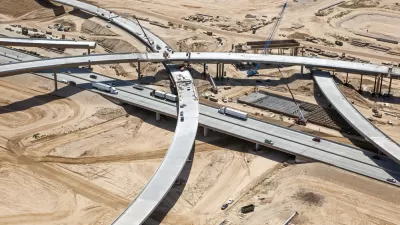As localities increasingly pursue public-private partnerships to fund much-needed infrastructure projects, Ryan Holeywell explores the promise and pitfalls of this popular financing arrangement. Are dissenting voices being stifled?
"Public-private partnerships (P3s) are clearly on a roll," observes Holeywell. "Last year’s congressional highway authorization vastly expanded the scope of federal mechanisms that provide low-interest loans for projects that typically involve privatization. In addition, the number of states that have passed legislation to enable privatization is on the rise. Many people see P3s as a game-changer: the best, and possibly only, way to repair and replace the country’s public works."
"Little, however, is said about the downside," he adds. "There’s a growing cadre of academics, activists, and state and federal auditors who question these public-private deals, but their voices aren’t always heard."
"Increasingly, it seems the discussion of P3s isn’t about whether it’s wise for governments to enter the deals; it’s about how governments can best facilitate them."
FULL STORY: Public-Private Partnerships Are Popular, But Are They Practical?

Planetizen Federal Action Tracker
A weekly monitor of how Trump’s orders and actions are impacting planners and planning in America.

Restaurant Patios Were a Pandemic Win — Why Were They so Hard to Keep?
Social distancing requirements and changes in travel patterns prompted cities to pilot new uses for street and sidewalk space. Then it got complicated.

Map: Where Senate Republicans Want to Sell Your Public Lands
For public land advocates, the Senate Republicans’ proposal to sell millions of acres of public land in the West is “the biggest fight of their careers.”

Maui's Vacation Rental Debate Turns Ugly
Verbal attacks, misinformation campaigns and fistfights plague a high-stakes debate to convert thousands of vacation rentals into long-term housing.

San Francisco Suspends Traffic Calming Amidst Record Deaths
Citing “a challenging fiscal landscape,” the city will cease the program on the heels of 42 traffic deaths, including 24 pedestrians.

California Homeless Arrests, Citations Spike After Ruling
An investigation reveals that anti-homeless actions increased up to 500% after Grants Pass v. Johnson — even in cities claiming no policy change.
Urban Design for Planners 1: Software Tools
This six-course series explores essential urban design concepts using open source software and equips planners with the tools they need to participate fully in the urban design process.
Planning for Universal Design
Learn the tools for implementing Universal Design in planning regulations.
Heyer Gruel & Associates PA
JM Goldson LLC
Custer County Colorado
City of Camden Redevelopment Agency
City of Astoria
Transportation Research & Education Center (TREC) at Portland State University
Camden Redevelopment Agency
City of Claremont
Municipality of Princeton (NJ)



























